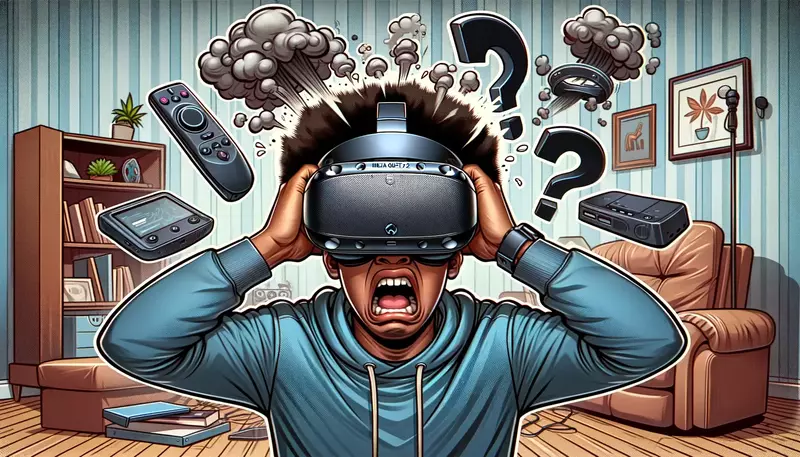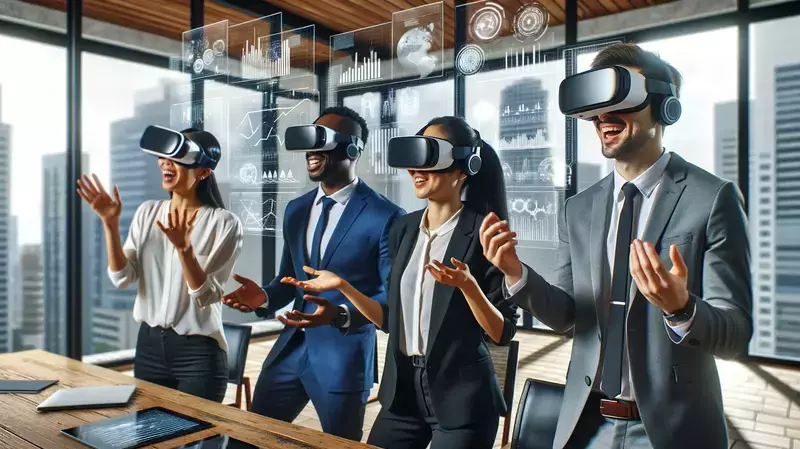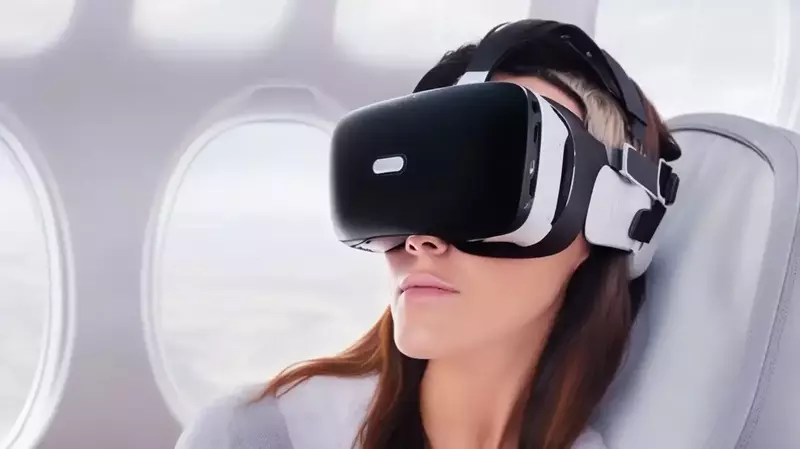This site contains affiliate links to products, and we may receive a commission for purchases made through these links.
Do you need internet for virtual reality? Virtual Reality (VR) is an immersive technology that has the potential to revolutionize how we experience and interact with our world. Do you need an Internet connection to get the most out of virtual reality?
Virtual reality can be experienced without the need for an internet connection. However, this may limit certain features and experiences available.
In this blog post, we’ll explore what exactly VR is, whether or not it requires an Internet connection, as well as the benefits and limitations of using VR without one. So if you’re wondering “do I need internet for virtual reality?”, then read on.

What is Virtual Reality?
VR is a computer-generated, three-dimensional reality with which an individual can interact realistically using specific electronic equipment. This technology makes users feel like they are in an artificial, simulated environment.
A HMD, consisting of two lenses and an LCD screen inside the headset, is the most commonly used type of virtual reality device today. These headsets are often connected to powerful computers or gaming consoles, allowing for high-quality graphics and sound. Other types of VR devices include hand controllers, motion sensors, and haptic feedback systems.
Using virtual reality without an internet connection does not require any additional hardware beyond what’s already included with the headset itself. Connecting to the web while utilizing VR can provide various advantages, such as gaining access to more material like games, videos and other activities; improved functioning thanks to higher data speeds; simpler social collaboration between gamers; being able to shop for related items in online stores; plus much more.
The main benefit of using virtual reality without an internet connection is that it’s generally less expensive than having one set up at home or on location since no extra hardware needs purchasing or setting up.
It also offers greater privacy since there’s no need for personal information being shared over the web when playing games or accessing content from within VR worlds – something especially important when considering younger users who may be exploring these environments unsupervised.
Additionally, those who don’t have reliable access to broadband connections may find this option beneficial too – particularly if they want a fully immersive experience without having their playtime interrupted by buffering issues caused by poor connectivity speeds during peak hours.
VR has the potential to profoundly alter numerous facets of life. It is essential to comprehend whether an internet connection is necessary for virtual reality encounters and how this influences users’ involvement.
Does Virtual Reality Require an Internet Connection?
No web connection is necessary to enjoy virtual reality. VR experiences can be enjoyed without a web connection, though some features may require one.
For example, online multiplayer gaming or streaming content from the web will need an active internet connection for optimal performance.
Utilizing virtual reality without an internet link furnishes users with the capacity to instantly enjoy their content, free of any lagging or postponements. Additionally, since there’s no need for downloading data over the web, users don’t have to worry about bandwidth caps or slow download speeds when enjoying their favorite VR games and apps offline.
However, this lack of connectivity also comes with its own drawbacks; such as not having access to online servers and databases for leaderboards or social media integration that are common in modern VR titles. Without access to online servers and databases, players won’t be able to enjoy certain aspects such as leaderboards or social media integration that come with many popular VR titles today.
In addition, if developers wish to modify their game or incorporate new elements, they must do so manually instead of using automated updates which could take longer depending on the frequency of alterations.
By opting out of an internet connection, players are missing out on a myriad of opportunities available online such as streaming services like Netflix and Hulu which offer an array of movies and TV shows in 3D format designed for virtual reality headsets – something not accessible offline.
Without an internet connection, gamers may be unable to take advantage of matchmaking capabilities which facilitate multiplayer gaming experiences.
Although it is feasible to take pleasure in virtual reality sans an internet connection, the range of experiences may be restricted when compared with those who opt for linking up utilizing assorted gadgets such as PCs, consoles, smartphones and tablets.
The ultimate choice of whether or not to employ an internet link for virtual reality is solely in the hands of each user. With that in mind, let us explore the benefits of using virtual reality without an internet connection in our next section.
What are the Benefits of Using Virtual Reality Without an Internet Connection?
Virtual reality (VR) has revolutionized the way we experience immersive and interactive environments. It allows users to explore a wide range of virtual worlds, from 3D video games to educational simulations.
VR users can benefit from not requiring an online connection, as this eliminates any latency problems brought about by slow or unreliable internet.
By eliminating the need for downloading content from the web, users can access local files stored on their device quickly and easily, enabling them to enjoy a smooth VR experience.
In addition, using VR without an internet connection offers improved security and privacy protection compared with online versions. Since no data is being transmitted over the web, there’s less risk of malicious actors intercepting sensitive information such as passwords or credit card numbers. This also means that users don’t have to worry about leaving behind digital footprints when exploring virtual spaces – making it ideal for those who value their anonymity online.
Offline use also makes it easier for people in remote locations or areas with limited connectivity options to take advantage of what VR has to offer. For example, those living in rural areas may not be able access high-speed broadband services – but they can still enjoy immersive experiences through offline applications downloaded directly onto their device via USB drives or other storage media.
Similarly, students in developing countries may not have reliable internet access at home but could still benefit from educational programs designed specifically for use with virtual reality headsets and controllers available offline on their devices.
Advantages of utilizing virtual reality without web access are plentiful, including decreased expenditure and enhanced seclusion. However, there are some limitations to consider before making the decision to go offline with your VR experience; let’s explore these in our next heading.
What are the Limitations of Using Virtual Reality Without an Internet Connection?
Without web access, virtual reality users are restricted in the activities they can engage in. Without access to online content, such as multiplayer gaming or streaming video from the web, users won’t be able to take full advantage of their VR setup.
Furthermore, certain activities may necessitate the use of extra components that must be connected to the internet or Bluetooth for them to function as intended.
To experience multiplayer gaming with remote companions, a connection to the web is necessary for everyone involved in order to interact and exchange data. Similarly, if you wanted to watch movies or videos on YouTube or Netflix while wearing your headset then again an active internet connection is required.
Another limitation of using virtual reality without an internet connection is that many of the features available within the software itself will not work correctly either due lack of updates or other services being unavailable offline.
This includes features such as voice commands which rely heavily on cloud computing technology and artificial intelligence algorithms which require constant input from servers in order function properly when disconnected from the net.
In addition, certain apps and games may not even run at all without a stable network connection due to technical limitations built into their codebase by developers who assumed players would always have access to one when playing their titles (especially those designed for online multiplayer).
As such, it is important for anyone considering buying a VR system to consider whether they will have regular access before investing in any hardware related purchases associated with it so they can get the most out of their purchase both online and offline alike.
FAQs in Relation to Do You Need Internet for Virtual Reality?
Do you need internet for virtual reality?
No, internet is not necessary for virtual reality. Although not essential, certain applications and experiences may necessitate an internet connection in order to access material or use particular functions. Multiplayer gaming necessitates an online connection to link gamers from all over the world. Additionally, streaming services such as YouTube VR will need a stable connection to stream high-quality video content. Lastly, if you plan on using voice chat with friends while playing a game or exploring a new environment together then you’ll also need an active internet connection for that too.
Can you use an Oculus without internet?
Yes, it is possible to use an Oculus without internet. An Oculus headset requires no internet connection for basic usage and most of the pre-installed content that comes with it. Nevertheless, for utilizing online elements such as games or streaming services, an internet connection is essential. Furthermore, some features may require a periodic check in with the server via an active internet connection to ensure proper functioning.
What is needed for virtual reality?
For an immersive experience, virtual reality requires the use of a headset such as the Oculus Rift or HTC Vive, which is equipped with two lenses for displaying separate images to each eye and tracking head movements, as well as sensors for detecting body part movement. The headset houses two lenses that display separate images for each eye and track head movements. It also has sensors to detect movement of hands and other body parts. A powerful computer is needed to process the visuals and audio required for virtual reality applications. High-quality headphones are often used with headsets in order to produce realistic 3D sound effects while playing games or watching movies in VR mode. Additionally, certain games necessitate the utilization of controllers or other input mechanisms to interact with the virtual world.
Can you use the Internet on VR?
Yes, it is possible to use the Internet on virtual reality (VR) devices. Many VR headgear have pre-installed browsers that let users explore the web in a three-dimensional space. Furthermore, many streaming services such as YouTube and Netflix can be accessed directly from the headset for an immersive experience. Furthermore, other applications such as Google Chrome or Mozilla Firefox can be used within a headset’s browser for an even more immersive experience when browsing the web in VR.
Conclusion
In the end, it is evident that virtual reality does not necessarily necessitate an online link. While there are some benefits to using VR without the need for an internet connection such as cost savings and increased privacy, there can also be limitations in terms of access to content and lack of multi-user support.
Ultimately, the decision to use an internet connection for your virtual reality experience is based on individual preference. Do you need Internet for Virtual Reality? It all comes down to personal preference.
Discover the possibilities of virtual reality and find out if you need an internet connection to access it. Uncover helpful resources to get started with your VR journey today!
!! For more information about the different VR headsets on the market, check out this product specification list.

Espen
Espen is the Director of PursuitMeta and has written extensively about Virtual Reality and VR Headsets for years. He is a consumer product expert and has personally tested VR Headsets for the last decade.




Leave a Reply